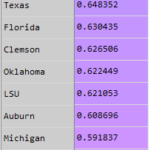 Treatment resistant depression (TRD), also known as treatment refractory depression, is defined as failure to respond to 1st and 2nd line treatments. The first question to consider is if the diagnosis of major depressive disorder is correct. It may be a misdiagnosis, and may be the reason for the lack of response to treatment. For example, it could be a medical problem like hypothyroidism, electrolyte abnormalities, and anemia (B12 or iron deficiency), just to name a few. The depressive symptoms could also be caused by a medication or a substance of abuse. Once the medical problems are ruled out, then the psychiatric diagnosis may be incorrect. For example, if the diagnosis is adjustment disorder with depressed mood, then psychotropic medication may not alleviate the depressive symptoms…typically psychotherapy and addressing the stressor is helpful.
Treatment resistant depression (TRD), also known as treatment refractory depression, is defined as failure to respond to 1st and 2nd line treatments. The first question to consider is if the diagnosis of major depressive disorder is correct. It may be a misdiagnosis, and may be the reason for the lack of response to treatment. For example, it could be a medical problem like hypothyroidism, electrolyte abnormalities, and anemia (B12 or iron deficiency), just to name a few. The depressive symptoms could also be caused by a medication or a substance of abuse. Once the medical problems are ruled out, then the psychiatric diagnosis may be incorrect. For example, if the diagnosis is adjustment disorder with depressed mood, then psychotropic medication may not alleviate the depressive symptoms…typically psychotherapy and addressing the stressor is helpful.
If indeed you have the right diagnosis of major depressive disorder, then the psychiatrist needs to consider if adequate dose and duration were tried with the previous treatments, and if not, to optimize the dose and duration. If symptoms continue after the optimization, then the psychiatrist may consider switching to a different class of antidepressant, such as switching from a selective serotonin reuptake inhibitor (ie sertraline- Zoloft) to a norepinephrine serotonin reuptake inhibitor (ie venlafaxine- Effexor). If this does not work, then the psychiatrist may consider augmenting the antidepressant with another medication such as lithium, thyroid hormone, or lamotrigine (Lamictal). Lamotrigine is a promising medication for TRD, and can even be used as monotherapy for TRD. Lamotrigine is advantageous for TRD in that it has a tolerable side effect profile when compared to other psychotropics for TRD like lithium. Lamotrigine just has to be dosed slowly to prevent severe rash from occurring.
Finally, electroconvulsive therapy (ECT), vagus nerve stimulation (VNS), and repetitive transcranial magnetic stimulation (rTMS) are last resort treatments for TRD. The most important aspect of TRD treatment is finding a psychiatrist who specializes in TRD and performs research in TRD. You can find these TRD-specialized psychiatrists at most university hospitals, as the university hospitals have all the infrastructure and expertise necessary to carry out the complex TRD treatments like ECT and VNS. rTMS is becoming more available in psychiatrists’ offices.
photo credit: danniatherton Image Library Danni Atherton Canberra ACT via photopin (license)







